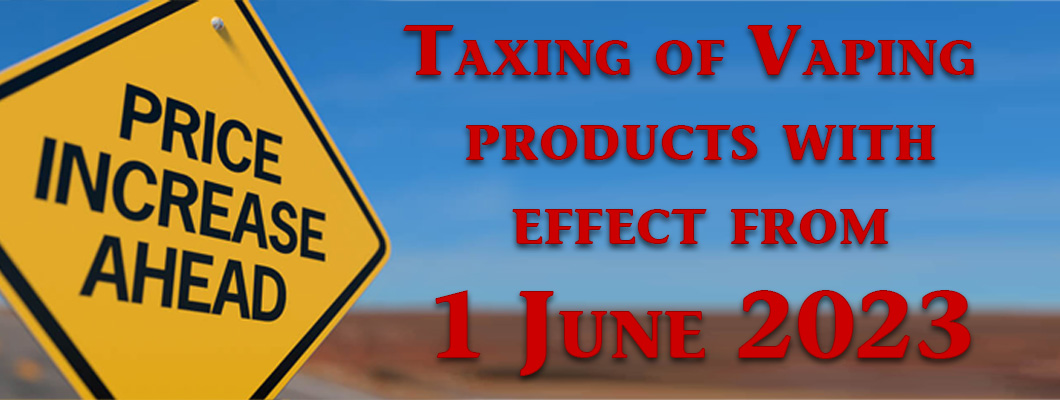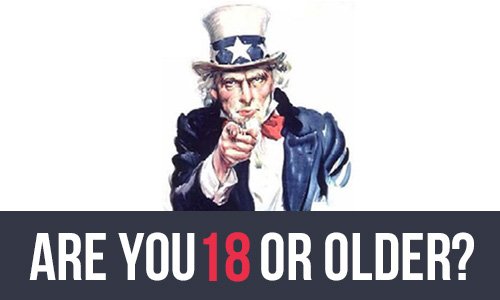
“The Minister of Finance announced in the 2022 Budget on 23 February 2022 that excise duty on vaping tobacco products would be introduced. Nicotine and nicotine-substitute solutions in vaping products will be included in the tax net with a flat excise duty rate of R2.90/ml from 1 June 2023.”
Yes, you read correct. Now the day is finally upon us as we are currently less than a month away from the 1st of June 2023. This may be the beginning of the end, as the CEO of Vapour Products Association, Asanda Gcoyi, had stated in February that the excise tax would damage the vape industry, as vape users would have to, for example, pay an additional R348 on a single 120ml bottle of e-liquid, on top of the existing price.
The excise tax duty is being imposed by the government because Vaping Products are not covered by the Tobacco Products Control Act or the Medicines act and are seen as unregulated since their introduction to South Africa in 2013. They are now processing the Tobacco Products and Electronic Delivery Systems Control Bill, as the Government believes that e-cigarette and vaping products are harmful and warrant regulation. This case is being backed by one mere study done by Professor Richard van Zyl-Smit, a pulmonologist and researcher based at the University of Cape Town. His study revealed that 25% of Matriculants in High-Income Schools vape mainly to cope with stress and anxiety, which has led to many students showing signs of developing an addiction to Nicotine.
This is not the case, as e-cigarettes and vaping products are tobacco harm-reduction products, aimed at lessening the health impacts associated with traditional tobacco products. With almost 7 million cigarette smokers in the country and over 39,000 annual deaths related to smoking, harm-reduction products should be what is advocated for at this current time, as vaping could reduce a smoker’s risk of any tobacco-related cancer, lung and heart diseases by 98%. It aids in improving quality of life and lung function in previous cigarette smokers, which protects smokers from nearly 7,000 chemicals in cigarettes and causes harm reversal from combustion tobacco products. However, The Government has chosen to frame the conversation around vaping products with negative anecdotes rather than backed-up science.
Heavy Regulation on e-cigarettes causes unreasonably high costs. This may drive poorer communities that suffer greatly from tobacco-related diseases to continue smoking cigarettes rather than picking healthier alternatives. This also brings the potential collapsing of the vape industry, with various e-liquid manufacturers closing operations from the 10th of May and many being at risk of losing jobs in both the vaping wholesale and retail sectors as sales could potentially drop by 22% after the 1st of June.
This would push users to the illicit market, where e-liquid and vaping products could be sold at cheaper rates, avoiding the excise tax. This is reminiscent of the cigarette ban during the Covid-19 Lockdown, which led to a R6 Billion loss in excise tax and jeopardizing 300,000 Jobs. The Government is still feeling the effects, as the ban had driven smokers to the illicit market, which now constitutes 42% of the cigarette market.
With E-cigarettes being associated with cost-effectiveness, safety and convenience, there has been a rapid rise in the shifting of consumer preference from traditional tobacco consumption to vaping. This attributes to e-cigarettes being sold as consumer products and the alarming number of people suffering from tobacco related diseases. The Government is now looking to take advantage of the vaping industry with the exorbitant price increases instead of embracing Tobacco harm-reducing products that could lead to reducing the number of cigarette smokers and the overall improvement of potential tobacco-related deaths in the country.
In conclusion, The Excise Tax that will be implemented on the 1st of June may do more harm than good for the entire country. The vaping industry can only stand back and attempt to weather the storm that comes with the tax regulation. Even though vape products may lead to a tobacco free-world and a reversal in tobacco harm, such regulations only punish those that decided to quit smoking.


-100x100.png)








-100x100.png)

-100x100.png)










-100x100.png)
-100x100.png)








-100x100.png)
Leave a Comment